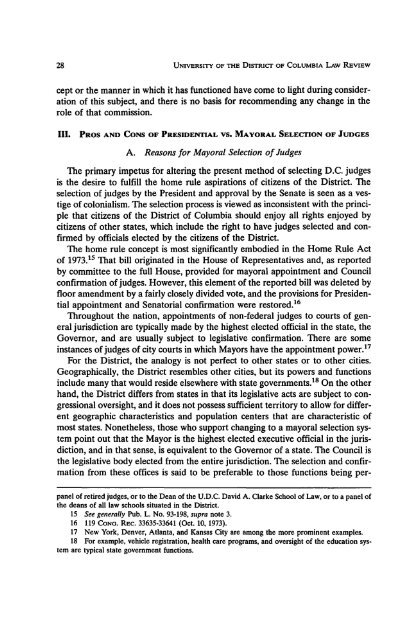Download Electronic Version - UDC Law Review
Download Electronic Version - UDC Law Review
Download Electronic Version - UDC Law Review
Create successful ePaper yourself
Turn your PDF publications into a flip-book with our unique Google optimized e-Paper software.
28 UNIVERSITY OF THE DISTRICf OF COLUMBIA LAW REVIEW<br />
cept or the manner in which it has functioned have come to light during consideration<br />
of this subject, and there is no basis for recommending any change in the<br />
role of that commission.<br />
III. PROS AND CONS OF PRESIDENTIAL VS. MAYORAL SELECTION OF JUDGES<br />
A. Reasons for Mayoral Selection of Judges<br />
The primary impetus for altering the present method of selecting D.C. judges<br />
is the desire to fulfill the home rule aspirations of citizens of the District. The<br />
selection of judges by the President and approval by the Senate is seen as a vestige<br />
of colonialism. The selection process is viewed as inconsistent with the principle<br />
that citizens of the District of Columbia should enjoy all rights enjoyed by<br />
citizens of other states, which include the right to have judges selected and confirmed<br />
by officials elected by the citizens of the District.<br />
The home rule concept is most significantly embodied in the Home Rule Act<br />
of 1973. 15 That bill originated in the House of Representatives and, as reported<br />
by committee to the full House, provided for mayoral appointment and Council<br />
confirmation of judges. However, this element of the reported bill was deleted by<br />
floor amendment by a fairly closely divided vote, and the provisions for Presidential<br />
appointment and Senatorial confirmation were restored. 16<br />
Throughout the nation, appointments of non-federal judges to courts of general<br />
jurisdiction are typically made by the highest elected official in the state, the<br />
Governor, and are usually subject to legislative confirmation. There are some<br />
instances of judges of city courts in which Mayors have the appointment power. 17<br />
For the District, the analogy is not perfect to other states or to other cities.<br />
Geographically, the District resembles other cities, but its powers and functions<br />
include many that would reside elsewhere with state governments. 1S On the other<br />
hand, the District differs from states in that its legislative acts are subject to congressional<br />
oversight, and it does not possess sufficient territory to allow for different<br />
geographic characteristics and population centers that are characteristic of<br />
most states. Nonetheless, those who support changing to a mayoral selection system<br />
point out that the Mayor is the highest elected executive official in the jurisdiction,<br />
and in that sense, is equivalent to the Governor of a state. The Council is<br />
the legislative body elected from the entire jurisdiction. The selection and confirmation<br />
from these offices is said to be preferable to those functions being perpanel<br />
of retired judges, or to the Dean of the U.D.C. David A. Clarke School of <strong>Law</strong>, or to a panel of<br />
the deans of all law schools situated in the District.<br />
15 See generally Pub. L. No. 93-198, supra note 3.<br />
16 119 CONGo REC. 33635-33641 (Oct. 10, 1973).<br />
17 New York, Denver, Atlanta, and Kansas City are among the more prominent examples.<br />
18 For example, vehicle registration, health care programs, and oversight of the education system<br />
are typical state government functions.














